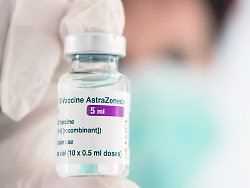Thursday, May 06, 2021
For everyone with a flexible interval
Spahn wants to completely release Astrazeneca
While fully and partially immunized people can look forward to corona easing, impatience is growing among those who are not yet in the vaccination series. According to Health Minister Spahn’s plans, an abbreviation could soon be the vilified Astrazeneca preparation.
Federal Minister of Health Jens Spahn is aiming for an immediate release of Astrazeneca’s corona vaccine for all those willing to vaccinate – without prioritizing according to age, previous illness or occupational group. This Thursday he wanted to talk to his country colleagues about it, he announced on Wednesday evening on WDR. One will then “clearly say at Astrazenca, for both medical practices and vaccination centers, that there is no longer any prioritization there”. For Astrazeneca this applies immediately.
What should be particularly important for many who want to be vaccinated: The interval between the first and second vaccination with Astrazeneca should be more flexible. An interval of three months is currently intended to guarantee optimal effectiveness. This means that those who are now having the Astrazeneca vaccine injected will not be fully immunized until the end of August – with Biontech and Moderna, full protection would already have been established at the beginning of July, and thus in time for the summer holidays. In order to make Astrazeneca more attractive, the vaccination interval should now be shortened to four weeks, according to Spahn. This is possible within the approval, stressed Spahn.
There are, in some cases, considerable reservations about the preparation of the British-Swedish pharmaceutical company. After blood clots appear in the brain in younger people who have been vaccinated, it is only used for those over 60 years of age. On the other hand, there are many younger people who would basically also be vaccinated with it, but are not yet in the vaccination sequence.
Call for relaxation also for the tested
So far, 29.5 percent of the population have received at least one vaccination. 8.3 percent are fully vaccinated, so if necessary they also received a second vaccination. The planned exemption of vaccinated and convalescent people from the restrictions should take the next hurdle at noon. The Bundestag then deals with an ordinance that has been introduced by the Federal Government in an accelerated procedure and also votes immediately. If parliament approves the new regulations, the Federal Council should seal them on Friday.
Accordingly, contact and exit restrictions for fully vaccinated and convalescent people should be eliminated. They should also be put on an equal footing with those who tested negatively and would no longer need a corona test for shops or at the hairdresser’s.
Now, more and more loosening is also being called for for those who tested negative, for example with regard to contact restrictions. “Many people could not be vaccinated because of a lack of vaccines,” said the chief executive of the German Association of Cities, Helmut Dedy, the newspapers of the Funke media group. “We will hardly be able to convey to people that only those who have been vaccinated and those who have recovered can meet indefinitely and carefree on a summer evening in the park or for dinner at home.”
Rapid tests are significantly less reliable
For those who have been tested, there are already extensive relaxations when shopping, visiting cultural institutions and doing sports. However, because of their susceptibility to errors, negative rapid tests provide far less security against virus transmission than full vaccination protection. With a view to the planned exceptions for vaccinated and convalescent people, the federal government’s authorized carer, Andreas Westerfellhaus, called on the states, municipalities and care facilities to adapt the locally applicable regulations to the federal ordinance. “Now the visit bans and contact restrictions for vaccinated home residents must be lifted,” he told the editorial network Germany (RND). Nevertheless, the Foundation for Patient Protection for Home Residents still sees many questions unanswered, as CEO Eugen Brysch told the RND.
The reliable proof of a complete vaccination in order to be exempt from the corona restrictions has not yet been finally resolved. “Protection against forgery is of course an important aspect with a view to the planned digital vaccination certificate”, said the chairman of the German Association of General Practitioners, Ulrich Weigeldt, the RND. “However, under no circumstances can the responsibility for this simply be passed on to the general practitioner.” You would already have a lot to do with patient care.
Germany wants to introduce a digital corona vaccination certificate together with the EU in June. For those who have already been fully vaccinated, the vaccination status should be transferred from the analog vaccination certificate. But there are already fake vaccination records in circulation.
.
